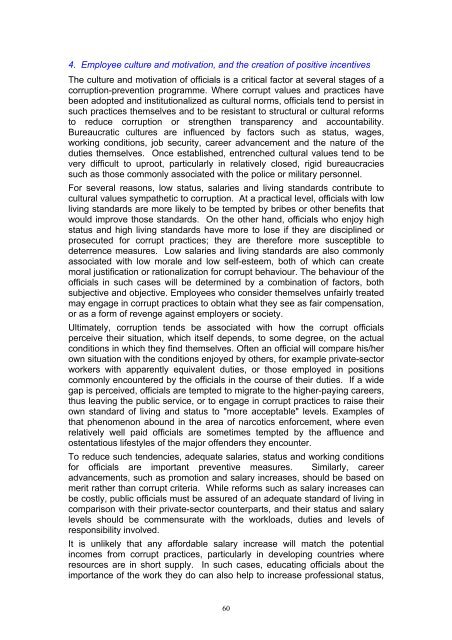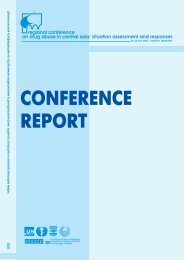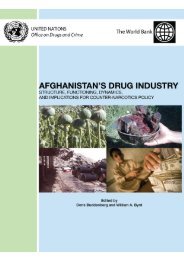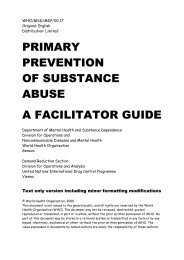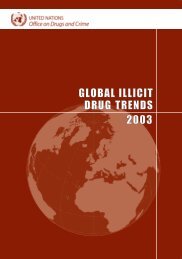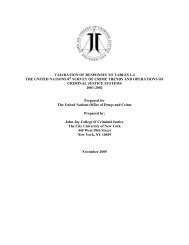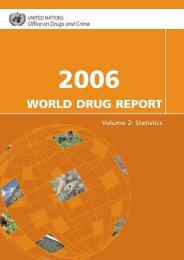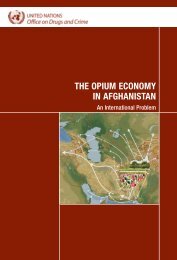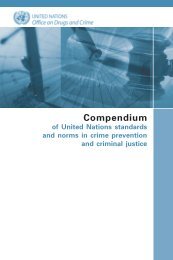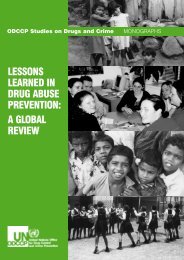UN Guide for Anti-Corruption Policies - United Nations Office on ...
UN Guide for Anti-Corruption Policies - United Nations Office on ...
UN Guide for Anti-Corruption Policies - United Nations Office on ...
You also want an ePaper? Increase the reach of your titles
YUMPU automatically turns print PDFs into web optimized ePapers that Google loves.
4. Employee culture and motivati<strong>on</strong>, and the creati<strong>on</strong> of positive incentives<br />
The culture and motivati<strong>on</strong> of officials is a critical factor at several stages of a<br />
corrupti<strong>on</strong>-preventi<strong>on</strong> programme. Where corrupt values and practices have<br />
been adopted and instituti<strong>on</strong>alized as cultural norms, officials tend to persist in<br />
such practices themselves and to be resistant to structural or cultural re<str<strong>on</strong>g>for</str<strong>on</strong>g>ms<br />
to reduce corrupti<strong>on</strong> or strengthen transparency and accountability.<br />
Bureaucratic cultures are influenced by factors such as status, wages,<br />
working c<strong>on</strong>diti<strong>on</strong>s, job security, career advancement and the nature of the<br />
duties themselves. Once established, entrenched cultural values tend to be<br />
very difficult to uproot, particularly in relatively closed, rigid bureaucracies<br />
such as those comm<strong>on</strong>ly associated with the police or military pers<strong>on</strong>nel.<br />
For several reas<strong>on</strong>s, low status, salaries and living standards c<strong>on</strong>tribute to<br />
cultural values sympathetic to corrupti<strong>on</strong>. At a practical level, officials with low<br />
living standards are more likely to be tempted by bribes or other benefits that<br />
would improve those standards. On the other hand, officials who enjoy high<br />
status and high living standards have more to lose if they are disciplined or<br />
prosecuted <str<strong>on</strong>g>for</str<strong>on</strong>g> corrupt practices; they are there<str<strong>on</strong>g>for</str<strong>on</strong>g>e more susceptible to<br />
deterrence measures. Low salaries and living standards are also comm<strong>on</strong>ly<br />
associated with low morale and low self-esteem, both of which can create<br />
moral justificati<strong>on</strong> or rati<strong>on</strong>alizati<strong>on</strong> <str<strong>on</strong>g>for</str<strong>on</strong>g> corrupt behaviour. The behaviour of the<br />
officials in such cases will be determined by a combinati<strong>on</strong> of factors, both<br />
subjective and objective. Employees who c<strong>on</strong>sider themselves unfairly treated<br />
may engage in corrupt practices to obtain what they see as fair compensati<strong>on</strong>,<br />
or as a <str<strong>on</strong>g>for</str<strong>on</strong>g>m of revenge against employers or society.<br />
Ultimately, corrupti<strong>on</strong> tends be associated with how the corrupt officials<br />
perceive their situati<strong>on</strong>, which itself depends, to some degree, <strong>on</strong> the actual<br />
c<strong>on</strong>diti<strong>on</strong>s in which they find themselves. Often an official will compare his/her<br />
own situati<strong>on</strong> with the c<strong>on</strong>diti<strong>on</strong>s enjoyed by others, <str<strong>on</strong>g>for</str<strong>on</strong>g> example private-sector<br />
workers with apparently equivalent duties, or those employed in positi<strong>on</strong>s<br />
comm<strong>on</strong>ly encountered by the officials in the course of their duties. If a wide<br />
gap is perceived, officials are tempted to migrate to the higher-paying careers,<br />
thus leaving the public service, or to engage in corrupt practices to raise their<br />
own standard of living and status to "more acceptable" levels. Examples of<br />
that phenomen<strong>on</strong> abound in the area of narcotics en<str<strong>on</strong>g>for</str<strong>on</strong>g>cement, where even<br />
relatively well paid officials are sometimes tempted by the affluence and<br />
ostentatious lifestyles of the major offenders they encounter.<br />
To reduce such tendencies, adequate salaries, status and working c<strong>on</strong>diti<strong>on</strong>s<br />
<str<strong>on</strong>g>for</str<strong>on</strong>g> officials are important preventive measures. Similarly, career<br />
advancements, such as promoti<strong>on</strong> and salary increases, should be based <strong>on</strong><br />
merit rather than corrupt criteria. While re<str<strong>on</strong>g>for</str<strong>on</strong>g>ms such as salary increases can<br />
be costly, public officials must be assured of an adequate standard of living in<br />
comparis<strong>on</strong> with their private-sector counterparts, and their status and salary<br />
levels should be commensurate with the workloads, duties and levels of<br />
resp<strong>on</strong>sibility involved.<br />
It is unlikely that any af<str<strong>on</strong>g>for</str<strong>on</strong>g>dable salary increase will match the potential<br />
incomes from corrupt practices, particularly in developing countries where<br />
resources are in short supply. In such cases, educating officials about the<br />
importance of the work they do can also help to increase professi<strong>on</strong>al status,<br />
60


